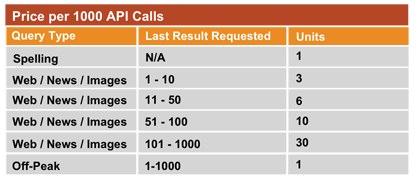Yahoo's new BOSS: another tool to milk pennies out of search?

In a sense, Yahoo is going back to basics by tapping the search index itself to be the core of a new business strategy. The company said today that it plans to impose a pricing and usage structure on its Yahoo BOSS (Build Your Own Search Service) API for developers later this year.
Originally, the idea was to make Yahoo BOSS an avenue for ad revenue. In exchange for access to the search index, developers had to place ads from the Yahoo ad network next to the query results on their sites. Under this new structure - rolled out under the new Carol Bartz administration - BOSS developers can tap into any ad network out there. Yes, even Google's.
Currently free, the new fees will only be applied to users that cross a specific daily usage threshold. It's a tiered pricing structure that's based not just on the number of queries but also how deep into the index the query should dig for results. The following are Yahoo's pricing examples from its BOSS pricing page:
- Developer A submits 7000 API requests in a given day. Each API call requests search results 1-10. Since 1000 requests of this type cost 3 units (for a total of 21 units) and each developer gets 30 units per day for free, Developer A is not charged anything.
- Developer B also submits 7000 API requests. Each API call requests results 1-100. Since 1000 requests of this type cost 10 units (for a total of 70 units) and each developer gets 30 units per day for free, Developer B will be charged for 40 units (70 - 30 = 40). The price of 40 units is $4.00 (40 x $0.10 = $4.00).

When Yahoo BOSS was announced last summer, my colleagues Larry Dignan and Ed Burnette sparred over the significance of the news. Larry called the shift to open source a sign of desperation; Ed countered by arguing that open source is not a dumping ground for lost causes.
Given what we know now - the crumbling economy, the hard-hit tech sector and the arrival of Carol Bartz - versus last summer (remember the Icahn-Microhoo drama?), I'd probably have to side with Ed on this one (sorry, Larry). Why keep trying to beat Google in the search engine ad game when you can tap into what's really valuable - the index itself - and start focusing on revenue-generating businesses that can be built around it? Bartz has said that a turnaround could involve cutting losses in some areas and investing in stronger areas that have growth potential.
Of course, there's the assumption that growth also includes revenue plan, not just a way of increasing the eyeballs on ads drawn from other networks. It may be tough to get developers to pay for something that's already free - though beefing up the service with new things such as longer character abstracts and enhanced results using Yahoo's SearchMonkey tool may dull the pain by making it feel like a premium upgrade.